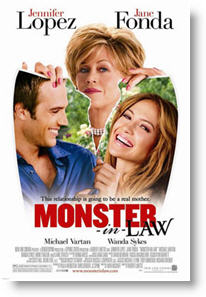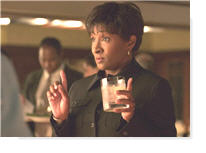Monster-in-Law
 for sex references and language.
for sex references and language.
Reviewed by: Keith Howland
CONTRIBUTOR
| Moral Rating: | Offensive |
| Moviemaking Quality: |
|
| Primary Audience: | Teens Adults |
| Genre: | Romance Comedy |
| Length: | 1 hr. 35 min. |
| Year of Release: | 2005 |
| USA Release: |
May 13, 2005 (wide) |







For a follower of Christ, what is LOVE—a feeling, an emotion, or an action?
What is true love and how do you know when you have found it?

Learn how to make your love the best it can be. Christian answers to questions about sex, marriage, sexual addictions, and more. Valuable resources for Christian couples, singles and pastors.
Should I save sex for marriage? Answer
How far is too far? What are the guidelines for dating relationships? Answer
What are the consequences of sexual immorality? Answer
What’s wrong with being gay? Answer
| Featuring |
|---|
| Jennifer Lopez, Jane Fonda, Michael Vartan, Wanda Sykes, Monet Mazur |
| Director |
|
Robert Luketic |
| Producer |
| Richard Brener, Julio Caro, J.C. Spink |
| Distributor |
She met the perfect man. Then she met his mother.
Charlotte (known as “Charlie,” Jennifer Lopez) lives life day-to-day, content but ever seeking. She works temp jobs to avoid being locked into doing one thing her whole life. As the film begins, she is a dog walker, doctor’s assistant, and caterer. She is single.
Kevin (Michael Vartan) is a handsome, successful, too-good-to-be-true doctor. He is single.
One day while Charlie is walking dogs on the beach, she sees Kevin jog by in his swimsuit. Later the same day, she is catering a party that happens to be for him. Fate? Well, Kevin did see Charlie see him on the beach and at the party. Plus, the movie is called “Monster In-Law”…
Viola (Jane Fonda) is a celebrity, daytime television interviewer—an “important” one, like Jane Pauley. She is wealthy and established, but her career is her life. (She is a widow and thrice divorced, so not too happy at home.) She is also getting older, and has just been informed of her impending replacement by a very young woman whose qualifications do not exceed being photogenic. Viola intends to ride out her remaining days with dignity, but the ignominy of it all is just too much, and she suffers a breakdown.
After a few months of institutionalization and therapy, Viola is released into the care of her long-suffering assistant, Ruby, and she claims to be fully healed. She still lacks inhibition, however—a problem that is soon exacerbated when Kevin visits to introduce Charlie to her, and then proceeds to propose marriage in front of her. It is utterly clear to Viola that this mere temp (whom she knows nothing else about) is insufficient for her only, much-beloved son. Kevin is all she has, and she will not stand by and watch his personal life end in the shambles she sees her own life in.
That is all the development this film provides. From the proposal (and Charlie’s acceptance) onwards, Viola is single-mindedly intent on making life so miserable for Charlie that she will relent and not marry Kevin. But soon Charlie realizes what Viola is doing and reacts in kind, thereby instigating an outright war of mutual meanness and escalating retaliation.
This is Jane Fonda’s first film in fifteen years. She appears to be enjoying herself immensely throughout her over-the-top performance. (She chews so much scenery, it is amazing there is any left by the end of the film.) Too bad we cannot have so much fun watching the film she inhabits.
The film’s flaws are legion—in plot, character, and tone. The story is all about shameless spite (except for a ludicrous turnabout at the end). It is awkward and embarrassing to watch, in part, because it is so mean-spirited, and in part because it is so underdeveloped. Viola’s nastiness is largely unfounded and therefore unrealistic. Instead of watching a character behaving in ways stemming from realistic character traits stimulated by what befalls her, we see only the wild machinations of a “monster” bred by nothing more than the requirements of the film’s title.
Perhaps Charlie’s retaliations are understandable enough, but she must do so in kind, therefore taking herself out of reality, too. Real people just do not interact this way for sustained periods.
Meanwhile, Kevin is absurdly ignorant of any dissention between fiancée and mother. How he can fail to see behavior that, in reality, would lead to police intervention? Other main characters are not people, but comic ciphers, and clichéd stereotypes. The viewer is therefore kept emotionally at a distance, guffawing intermittently as though watching orangutans at the zoo.
The film is also offensive on many counts. We have come to expect “romance” movies to be about beautiful people meeting in a cute, contrived way and falling swiftly into bed. Thankfully, the falling into bed part is only referred to in this film, by the fact that the couple moves in together before marriage. This makes the concept no less offensive, however, and the restraint in this area is not matched elsewhere in the film. The language is full of profanities, sexual innuendo, and uses of the name of God and Jesus in irreverent ways. Sexual references include much mention of promiscuity and homosexuality as though they were totally normal.
This view of sexuality is entirely contradictory to the truth revealed in God’s Word, which is that God instituted sex as an act between one husband and one wife within the covenant of marriage (Genesis 2:18-24; Matthew 19:4-6; I Corinthians 6:16). As such, God prohibits sex apart from marriage (Exodus 20:14; Matthew 5:27-28). This includes any sexual activity not between one husband and his one wife—thus God calls homosexuality “detestable” (Leviticus 18:22), and catalogs all sexual immorality along with theft, drunkenness, slander, swindling, and idolatry as sinful traits that exclude people from the kingdom of God (I Corinthians 6:9-10).
That said, God mercifully grants complete forgiveness to all people who would commit such sins. Nobody is beyond His redemption in Christ--rather, those whom He forgives are washed clean of these sins and are called to live in them no longer (I Corinthians 6:11).
The film includes mention of horoscopes, karma and use of Tarot cards. Charlie claims to be “more spiritual than religious.” Each of these things posit a worldview in which there is no God—no absolute personal being who created us and to whom we are subject.
Again, this is contrary to the truth. From the very first sentence in the Bible (Genesis 1:1), we are told that there is one pre-existent, supreme, personal deity who created everything, and especially created humanity to bear His image of perfect righteousness. This we have all failed to do since Adam and Eve (Genesis 3; Romans 3:23; etc.), and therefore we are distanced from Him by our own sin.
This is the central fact of all human existence that “spirituality” consisting only of introspection and personal feelings fails to address. Death and damnation await every sinner, and only personal profession of Jesus as Lord (John 14:6; Romans 10:9-10; etc.) can reconcile someone to God and save him or her from this just fate. But claiming Jesus as Savior necessarily entails repentance of sin--be it rage, homosexuality, or anything else—and repentance requires recognition that the behavior in question is indeed sinful.
There is no room at all in this film for acknowledgement that any action is wrong, except in the sense that it resulted in consequences for which a character did not wish. That, above all, is why this “Monster” is so offensive.
If your idea of entertainment is a couple of shamelessly immoral people being sadistic to each other, then this film is for you. All others steer clear.
Violence: Minor / Profanity: Moderate / Sex/nudity: Mild
See list of Relevant Issues—questions-and-answers.


More than anything this movie saddened me. It left me feeling so empty. It made fun of what a family is really supposed to be. The wickedness and caniving behavior of Jane Fonda’s character and then with Lopez’s character. It showed what length some people will go to to get their own way. It was disturbing really. Let’s face it, not everyone gets along with their inlaws, I have been very blessed in that department, but not everyone is. You would think that Lopez’s character would go and talk to her fiance about what was going on and be honest in their relationship, but no, she plays the same game as Fonda. “Do not be overcome by evil, but overcome evil with good” is the first scripture that comes to mind. “Kill ’em with kindness” “love them out!”
“Love conquers all” this is the type of attitude that God calls us to… to love the offender so much that they have no choice but to love back. If this does not work, as we know sometimes it does not work… then we are called to “shake the dust of our feet” and not “cast our pearls before swine” BUT we certainly are NOT called to be evil in return!!
Those are my thoughts. I was disappointed that the one time we got to go on a date we were bombarded with such bad representatives of what marriage and family are supposed to be all about. It’s not about back biting, caniving, manipulating, dishonesty and lying to get what we want; its ALL ABOUT A GIVING OF ONESELF AWAY TO ANOTHER. It HAS to be. This movie failed in that regard, and yet again, made us women look like manipulating witches, and men like soppy milk toast who are not able to see what’s going on around us in the lives of those they love the most.
Extremely Offensive/2
Offensive/2
Average/4½
Better than Average/4
Average/5
What’s Good: The recently converted Jane Fonda is absolutely incredible as the Evil Monster In Law to be. She has some of the best facial expressions that we have seen since Steve Martin in the 70s. A far from the contrived expressions of Jim Carrey comes the most realistic and uncanned humor that we haven’t seen in years. Jennifer Lopez is not one of my favorite actresses because of her personal life, but with that aside, she does a very good job in her roll as the woman marrying Michael Vartan. The chemistry is great between J-Fo and J-Lo and the Jane Fonda’s side kick stooge Wanda Sikes is the show stealer, as the reluctant assistant of her maniacal boss. Michael Vartan is not in the movie enough to develop any real chemistry between Jennifer Lopez but that does not really hurt the movie, because the movie really has nothing to do with him. The movie is about the rivalry between Jennifer ane Jane.
What’s Bad: Going into this movie, you know that it is a comedy made by Hollywood and not by your standard Christian conservative. Therefore the movie does EVERYTHING in its power to promote and ANTI BUSH agenda and a STAUNCH PRO CHOICE mindset. It blatantly tells children be educated about the meaning of Roe vs. Wade so that they can start voting a new administration into office. That is almost verbatim what is quoted during the first 30 minutes. Then the Pro Choice agenda is then repeated again throughout the rest of the movie. J-Lo and Michael Vartan do move in together about 30 days into knowing one another, and the movie makes this as a normal way of life, yet IT IS for someone who is not a Christian, so that part was expected. Homosexuality is promoted as a normal way of life as well. J-Lo’s (Jennifer Lopez) best friend is your token gay male who eventually ends up finding the man of his dream by the end of the film. There is some sexual humor, discussion about the male body part, and some mild language in the movie as well.
I would say that this movie is not for anyone UNDER 15 but if you do not expect a Christian Movie, then you get exactly what most other romantic comedies are like out there. A fun movie with a liberal agenda and a predictable ending, but all together a decent movie for your $8.00. I give this movie 3 of 4 Stars
Offensive/3½
I feel the Christian community as a whole (regardless of denomination) needs to acknowledge the increase awareness of mother-in-law conflicts. I suggest more sunday school topics and bible study topics that deal with the innate nature of some females (even Christians)to be catty or to behave controlling like Jezebel. There are Christian women out there who are not willing to leave “self” behind when dealing with the sons and their wives. They are forcing their sons to choose, when the Bible says “leave and cleave.” Thus they become horrific stumbling blocks to their sons and the younger women. Older women need to be reminded that they can not enjoy a Naomi/Ruth relationship if the Naomi acts like Jezebel. The Ruths will be hard pressed to stay and protect the Naomis, instead they may even outright reject Naomi’s people. Can you imagine what biblical history would have been like if Naomi was a monster-in-law?
Moral rating: Extremely Offensive / Moviemaking quality: 3
Average/4
Average/3½

My Ratings: Offensive/1